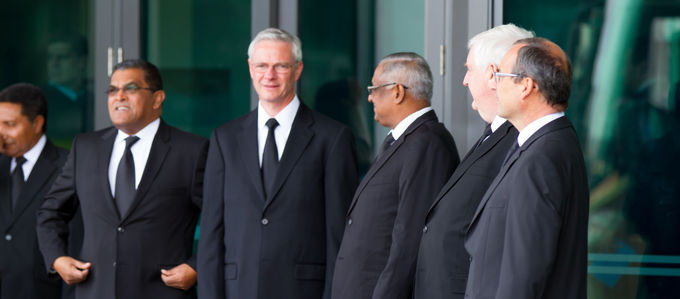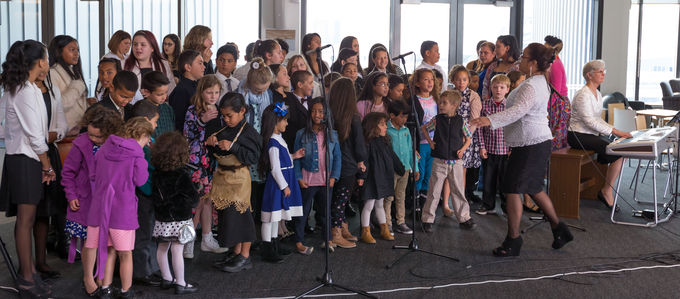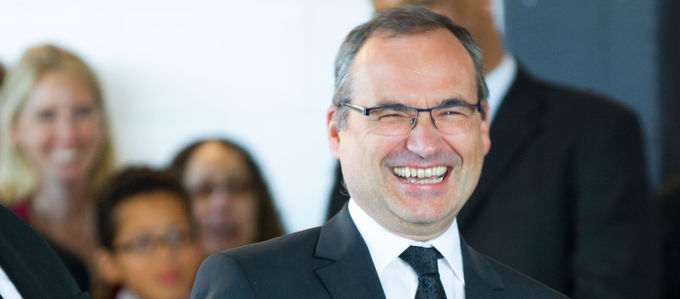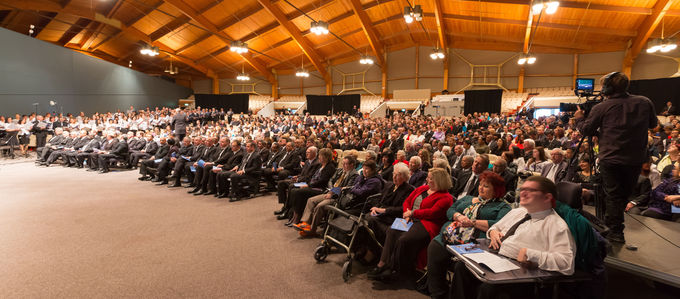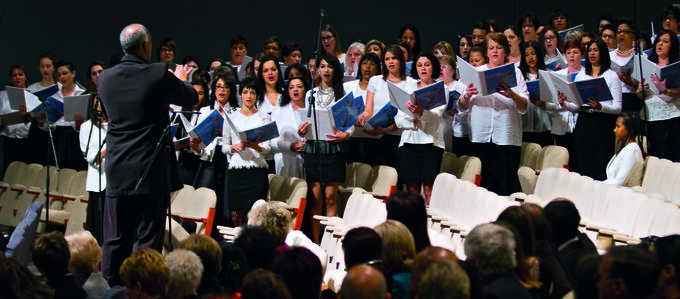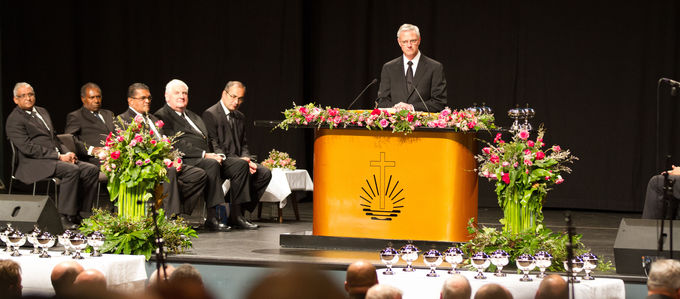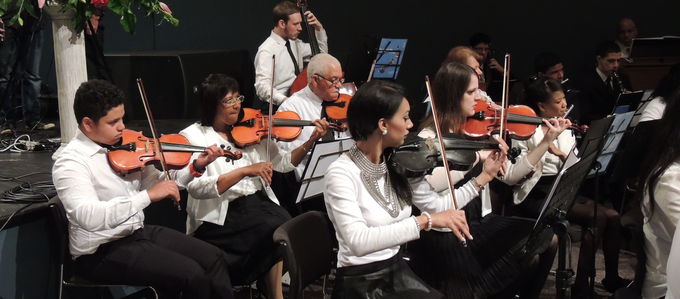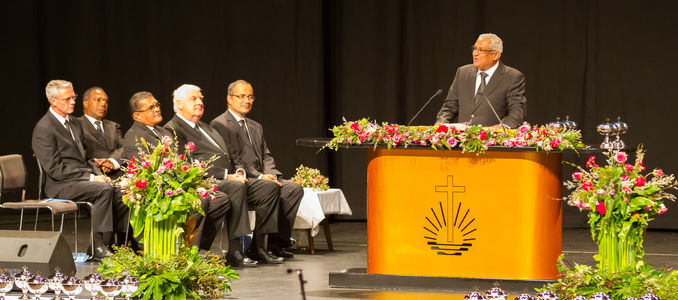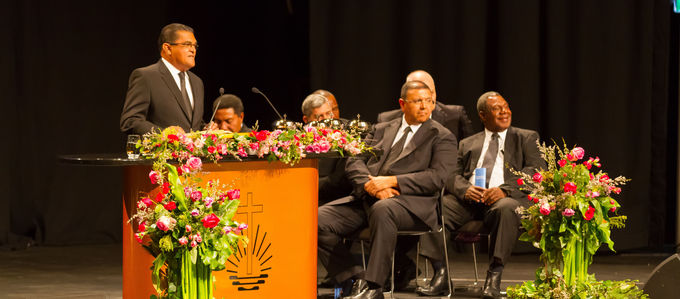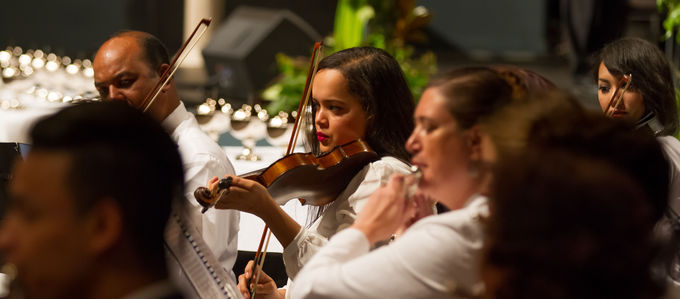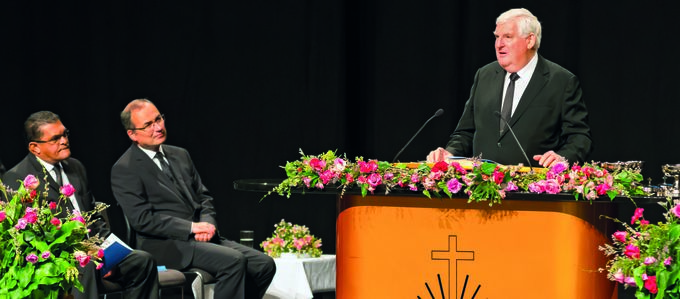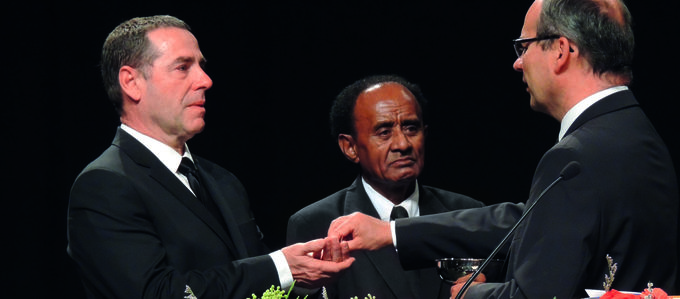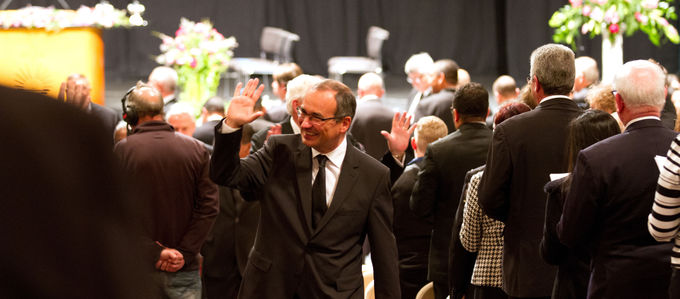God’s covenant then and now
God in His love made a covenant with man. In a divine service in Auckland recently, the Chief Apostle drew parallels between the people at the time of Moses and us today, and emphasized how important our faith in the sacrifice of Jesus and in His return is. He also addressed the importance of Holy Communion.
Nearly 900 brothers and sisters participated in the divine service in Auckland in New Zealand on Sunday, 13 September 2015. An additional 1,100 members in congregations on New Zealand’s South Island, in Australia, Fiji, and Papua New Guinea received an audio-visual broadcast. The Chief Apostle based his sermon on Deuteronomy 5: 3, “The Lord did not make this covenant with our fathers, but with us, those who are here today, all of us who are alive.”
Deliverance, promise, and law
“God had chosen the people of Israel out of love and made a covenant with them,” the Chief Apostle said at the beginning of the divine service. Israel was certainly not the biggest nation, nor the strongest, nor the most important one at the time. “There was actually no plausible reason for God to elect this people, but He did it out of love and grace, and made a covenant with them.”
And then the Chief Apostle illustrated how this election was manifested. First, God freed the Israelites from Pharaoh and Egyptian slavery and told them at Mount Sinai, “Then you shall be a special treasure to Me above all people” (Exodus 19: 5). That was the first part of the covenant. Then God led the people through the Red Sea, saving them from Pharaoh’s soldiers who were in hot pursuit. “He gave them a promise and told them what plans He had with them: they were to enter a land flowing with milk and honey.” And as the third part of the covenant, God gave them the law and told them, “If you do according to this law you will be blessed.”
Forty years later
“All of this, their deliverance, their escape through the Red Sea, the covenant, the happenings at Mount Sinai, had happened a long time ago—and the generation who had witnessed this was dead,” the Chief Apostle explained, referring to the time after the trek through the wilderness. There was nobody left except Moses and a few others who had actually been there at the crossing of the Red Sea and then later on witnessed how God Himself had spoken to the people.
“The generation to which Moses was speaking to now knew all of this only from oral accounts. None of them had been there. You know, it is always the same story. When old people tell us something we tend to think, ‘It’s probably a little bit exaggerated.’ When you only hear about something and have not experienced it yourself, you wonder how much truth there is to a story and whether it has not been embellished a little here and there,” the Chief Apostle said; also with a view to our time.
Moses had summoned the new generation and addressed them. He wanted to
- assure the people that the covenant God had made was still valid;
- remind the people of the promises God had given with respect to the Promised Land;
- call on the people to keep the divine commandments.
Moses was aware of the dangers. He realized that the people might forget the covenant, and that the contact with other nations might lead the Israelites to question the law of God. Other nations were as happy and successful as they were and they did not necessarily live according to God’s law.
A new covenant: God sends His Son
God sent His Son to deliver His own. “His disciples witnessed the whole thing. They knew Jesus, they lived with Him, they spoke to Him, and they had encounters with the Risen One and knew: ‘It’s Jesus. He died and rose from the dead. He gained the victory over death,’” Chief Apostle Schneider said.
By sending His Son to earth, God made a new covenant. He elected Himself a new people and
- delivered them from the bondage of sin through the sacrifice and resurrection of Jesus;
- promised them to lead them into His kingdom; and
- gave them His commandments, which are a source of blessing for those who keep them.
Referring to the activity of Jesus, the Chief Apostle said, “He gave His disciples His commandments and the gospel, and told them that if they kept all of this they would be blessed. This happened two thousand years ago. What about today?”
Today nobody can say: I have seen the Risen One; I can verify this; He has risen indeed, as He said He would. “And I must say, even in Christianity you hear, Well, who knows whether the story of Jesus’ death and resurrection really happened that way … maybe it has been exaggerated a bit,” the Chief Apostle stated. “That somebody had to die for us, for our salvation, is that not a bit much? Many find this a little strange and disconcerting today. That is a danger of our time!”
Faith in the resurrection of Jesus is essential
“The ministry of the new covenant, the Apostle ministry, was sent by the Lord to bear witness to Christ’s sacrifice, His death, and His resurrection. Believe in the resurrection of Jesus Christ! It is the truth!” the Chief Apostle said. “All of this happened for your sake, for your salvation: Jesus died for you, and He rose for you, and He will come back for you to save you. This is the covenant God made with you.”
“Some think that this message was something for our ancestors,” the Chief Apostle continued. “They had a difficult life. They had to struggle for survival, had to deal with poverty, sickness, war, and many dangers and crises, so they simply needed something that gave them hope: yes, one day, you will be delivered. Then everything will be better!” – But what about today?
Many people nowadays think they don’t need God. They are quite happy without Him. Their goal is not eternal fellowship with God in His kingdom, but a pleasant life here in earth. They think, “We have our life under control, there are solutions for many problems. There is peace in our country, and we can build ourselves a future. We no longer have to hope for a better future in heaven,” the Chief Apostle said. But the people of the new covenant have been taught by the Holy Spirit and they long for eternal glory, which has been promised by Christ (Johannes 14: 14–15).
The Holy Spirit teaches
It is the task of the Holy Spirit today to teach people who Christ is, to teach them about the glory of Christ, and to lead them into the knowledge of Christ and into His grace. The ministry of the new covenant, the Apostle ministry, has also received the commission to celebrate Holy Communion. “Every time we celebrate it, we reinforce this covenant.”
“We do not need the gospel to become rich, successful, and happy, and to prosper here on earth. There are many other ways to achieve that. But to experience the love of Christ, to experience His kindness and His nearness, and to know Him, there is only way: obedience to the gospel, and implementing it in our daily lives. This already applied to our ancestors and it applies to us today. We do not practice the gospel to get more money, to be spared from illness, or to make sure that our children prosper. We obey the commandments of the Lord, the law of God, because we want to experience the love of Jesus Christ.”
“His covenant, the new covenant, is not for our ancestors. It is for us who are here and alive today. We believe that Christ died for us and that He will come back for us,” Chief Apostle Schneider said in conclusion. That is why divine services and Holy Communion are so important.
Article info
Author:
Date:
Keywords:
Oliver Rütten
24.10.2015
Australia and Oceania,
New Zealand,
Chief Apostle,
Divine service,
journeys of Chief Apostle


